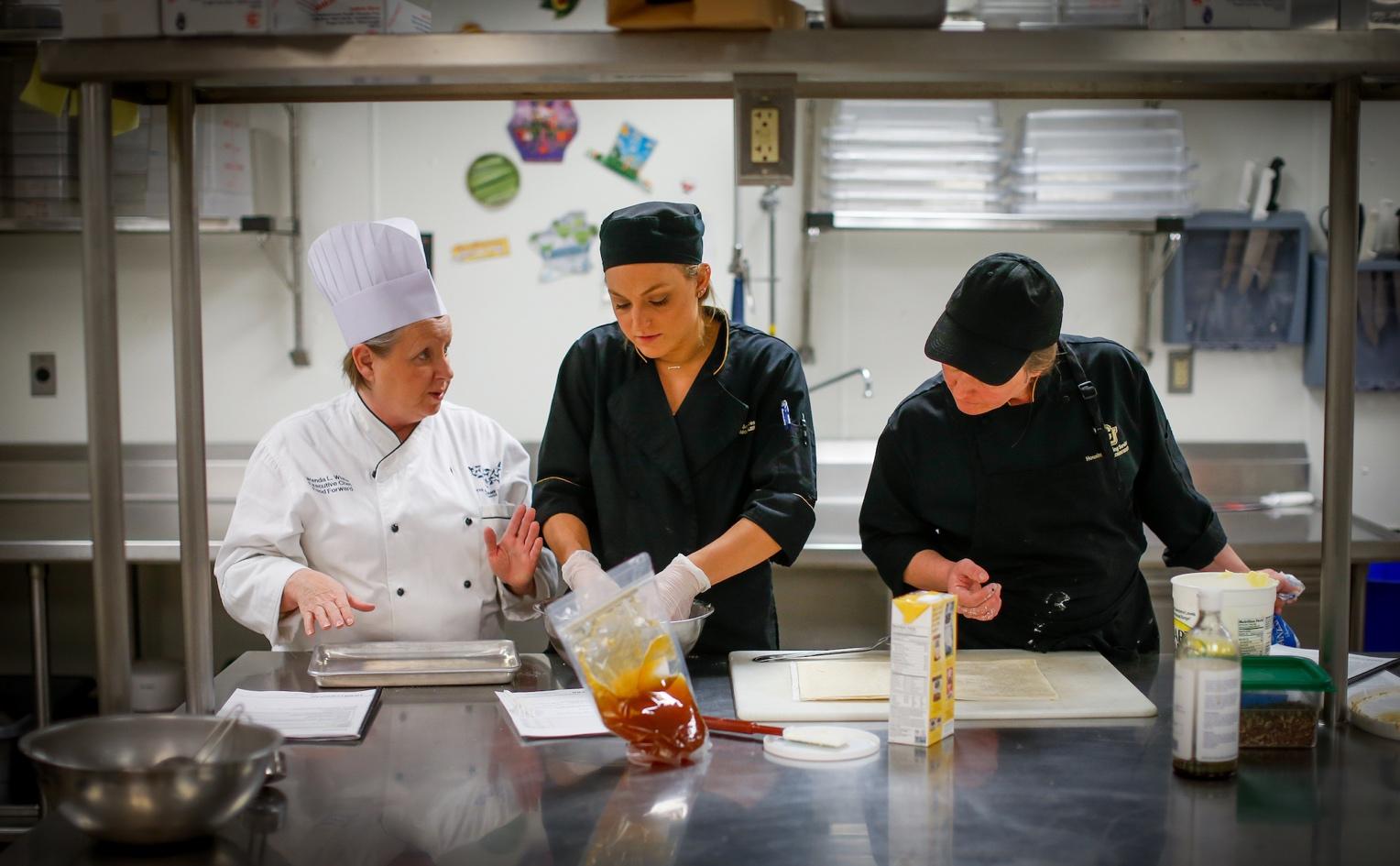Riana Topan is a campaign manager with Humane Society International/Canada, which together with its affiliates is the largest animal protection organisation in the world. She works to protect farm animals by advocating for higher-welfare policies and regulations, and supports institutions in offering plant-based food options that are better for the animals, the environment, and human health. You can reach her here.

Image: Chef Wanda White, one of the creators of the Forward Food Culinary Experience, guides two chefs through a plant-based recipe during a culinary training event. Lance Murphey/HSUS
Plant-based prominence
It’s no secret that the popularity of plant-based foods has grown exponentially in recent years. Be it for environmental, health or animal welfare reasons – or all three – many people are looking to incorporate more plant foods, especially plant-based proteins, into their diets. As a result, institutions such as universities, colleges, schools and hospitals are working to provide more plant-based menu options, and the impacts are far-reaching. A shift towards a more plant-centric menu at a single large-scale institution can lead to significant improvements in their environmental “foodprint” and the nutritional quality of their meals, while reducing the number of animals farmed for food and overall food costs.
Many chefs, however, have never been trained in how to prepare plant-based meals that customers will like – very important when customers make food choices based on taste, convenience and cost. It can be surprisingly simple to create tasty, plant-based dishes, but it does require a bit of a re-think for culinary specialists who have spent their whole careers working with animal ingredients.

 Chefs at the University of Colorado prepared a beautiful spread of plant-based dishes as part of a Forward Food culinary training in March 2016. Lance Murphey/HSUS.
Chefs at the University of Colorado prepared a beautiful spread of plant-based dishes as part of a Forward Food culinary training in March 2016. Lance Murphey/HSUS.
Recognising this, the Humane Society of the United States and Humane Society International (HSI) Canada launched an innovative programme called Forward Food. The programme helps leading institutions offer more sustainable, healthy dishes that are 100 percent plant-based. Our pragmatic approach to food system change has received widespread praise and achieved meaningful results.
Bringing food forward
Developed in response to a request for culinary assistance from Harvard University back in 2015, the Forward Food programme has now hosted well over 200 events in partnership with institutions in the United States, Canada, the United Kingdom and the European Union. We have worked with major food service management companies, dozens of higher education institutions, public school districts and even the U.S. military, offering hands-on culinary trainings, assistance with recipe development, sample menu ideas and nutritional advice, all free of charge. HSI has also developed and launched similar plant-based culinary training programmes, including Green Monday, Lunes sin Carne (Meatless Monday) and Carnes da Terra (Meats of the Land), training hundreds of chefs around the globe, including in Mexico, South Africa, Brazil and Vietnam.
As the demand for plant-based options continues to grow – the global plant-based protein market is expected to reach nearly USD 11 million by 2022 – programmes such as Forward Food are becoming all the more important. Speaking from personal experience, I know that it becomes infinitely easier to make better food choices when you actually have choices. I adopted a fully plant-based diet more than five years ago, and even then the pickings were slim (the pioneers who went plant-based decades earlier have my utmost respect). As cafeterias and restaurants start to offer more options, it is getting easier to dine out as a vegan.
Ultimately, a major focus of Forward Food is increasing choice by introducing a wide range of new dishes, all the way from breakfast through dessert. Our recipes (available here as a free resource) use both whole food plant proteins, such as legumes and peas, and analogues of traditional animal-based products, including plant-based meats, cheeses, butters, eggs and milk. We aim to provide options for different palates and budgets, knowing that what works well at one institution (or country, for that matter) may not be best for another. Chefs and diners at some university campuses, for example, have been pleasantly surprised by the high quality of modern plant meats and the extremely convincing plant-based spreads and dips now available.
Measuring success
As a results-oriented programme, we measure success in two ways. First, through the positive relationships we’ve built with institutions who now place a high value on the programme, championing and furthering our work. We regularly hear that our workshops and trainings have inspired all kinds of changes – for example, there’s Executive Chef Victor from Carnegie Mellon University in the United States, who attended a Forward Food Leadership Summit in February 2017 and changed his personal diet to be completely plant-based the very same day. Chef Victor aims to offer the best possible food on campus, and created a new plant-based station in Carnegie Mellon’s main dining hall called “Garden Bistro” for that very purpose.
Or take the example of the University of Pittsburgh Medical Centre, which hosted the summit that Chef Victor attended. Afterwards its executive chef and executive director of food and nutrition changed their diets, too. They now work consistently to influence the healthcare system’s menus, partnering with us on culinary trainings and other plant-based efforts throughout their many locations.
Second, and equally important, are the commitments from our partners to increase plant-based menu offerings. In the just over three years since the programme began, more than 500 university and college campuses, hospitals, school districts and other institutions have pledged to offer more plant-based options, impacting millions of meals each year. The rate at which customers choose the plant-based options has increased dramatically in almost every case, and at some institutions the plant-based entrées have become the most popular items on the menu. For example, the University of North Texas’s entirely plant-based dining hall is the second most popular cafeteria on campus, and 90% of guests are omnivores. At Canisius College in New York state, an underperforming vegetarian station saw a 400% increase in sales after it transitioned its menu to be fully vegan.
A few highlights from the HSUS and HSI culinary training programmes:
- HSI partnered with four cities in northeastern Brazil to transition all 137 public school cafeterias to 100 percent plant-based by the end of 2019, a change that will impact over 23 million meals a year. The pupils are really enjoying the new meals so far, and the entire community is involved in lectures that explain the programme and offer parents a chance to raise questions or concerns.
- The University of Witwatersrand in South Africa partnered with HSI Africa’s Green Monday programme to launch 23 plant-based dishes in all six of its residence dining halls, one of which is the first dining hall in Africa to exclusively offer 100 percent plant-based dishes on Mondays.
- Arizona State University, the largest public university in the U.S. by enrolment with more than 76,000 students, introduced a new 100 percent plant-based station called “Daily Root” in all seven of its dining halls.
Lessons learned
Of course, that’s not to say that the programme hasn’t faced any challenges. Whenever there’s change, there’s resistance to change. There have been some concerns from farming communities about the impact the programme will have on their business, though those concerns are often alleviated when they realize that we want to support sustainable, local agriculture wherever possible. The Forward Food programme was created to support a demand that already exists: consumer trends are changing to favour plant-based foods and producers must adapt to meet that demand, or risk becoming irrelevant. Perhaps this is why some big meat companies are investing in plant-based alternatives.
We are also still refining the programme’s implementation in different regions of the world, trying to account for regional dietary preferences and culinary traditions. In Canada, for example, we have created plant-based versions of regional favourites such as poutine and Acadian meat pie. In Brazil, the programme has adapted recipes for traditional dishes such as Moqueca and Feijoada, using tofu in place of the usual fish, beef and pork.
Ultimately the model seems to be working, which we attribute to its collaborative approach to creating change and the focus on delicious food. We regularly receive feedback from programme participants whose approach to plant-based cooking has completely changed as a result of working with us. For example, one participant said in a survey, “Okay, these jerks are going to teach me how to cook vegetables. Big freaking deal… The training, however, did open my eyes a lot. The variety and diversity of items prepared showed me how just a little bit of exposure to different preparations can spark a whole new way of looking at putting together vegan food. With the philosophy and direction we received, I feel more inclined to create a station not ‘devoid of meat’, but rather in celebration of vegetation and the amazing things that can be created with it.”
If you want to help support the programme, please feel free to share our resources or get in touch with us to inquire about becoming a programme partner. You can also get involved with the global Meatless Monday initiative or Menus of Change, both of which we have worked with and which have been highly successful in promoting plant-powered foods. The World Resources Institute’s Better Buying Lab is another a great resource; we often share their research with our partners and are eagerly awaiting their findings on how to meaningfully market plant-based options. Finally, if you would like to encourage institutions in your region to offer more plant-based options, just keep in mind that in addition to knowing why they should serve more sustainable meals, they may also need some help in learning how to make it happen.
You can discuss this blog post in the FCRN's Google Group, which you can join here.






Post a new comment »